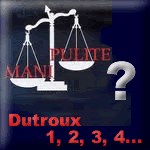| Organe de presse | ||||
| HOME | ||||
| Change
language |
|
|||||||||
| Droit Fondamental | |||||||||
Jacqueline
de Croÿ - 7 septembre 2010
The good relationship between justice and poly-criminal networks has grown from the car trafficking. Insurance companies pay between 750 and 1,250 euros in cash, for information that allows the police to find stolen vehicles. The amount offered varies depending on whether the vehicle is found within the month of theft, the date by which the insurer is required to indemnify the insured. If the car is found later, the insurer becomes the owner of a decommissioned vehicle, which can only be sold for an amount inferior than the indemnity paid.
Insurance companies request from the police the guarantee that the informant is not involved in the robbery and the thieves are arrested or about to be. However, the best informants are the worst paedocriminals, who see nothing wrong in selling a child to prostitution, thus even less wrong in denouncing a friend for the price of a pass. Their rare perversity is thus precious to the insurance companies. The judges and police officers who are only interested in the results that gives advance to their carriers, do not hesitate implementing the judicial sabotages necessary to avoid prison to the best informants, thus the worse criminals.
The example of the police protection reserved for paedocriminal informants is given by Marc Dutroux, at the time he was under the effect of a 13.5 years prison sentence for having kidnapped and raped five girls while they where filmed. The police have protected him from a complaint of indecent assault on three young girls on the seventh month of his parole. The Chief Commissioner of the Charleroi police gave him permission to hold a firearm for defence, after the police had discovered an unregistered.22 Long Rifle at his home. He was left free when reported for having offered 150,000-FB (3.719-€) to the step-brother of one of his neighbours to abduct children he planed to lock in a dungeon he made in his cellar, while waiting to export them. The police did not check the information of another neighbour, who testified she had seen a kidnapped little girl at his doorstep. He has been left free to kidnap fifteen young girls to make films of rape and murdered of four of them until he recurred over the daughter of a gendarme. The informers have all the rights, except harming a police officer or his family. He was arrested.
The dossier shows another paedocriminal informant at the service of the same "stolen car" squad of Dutroux, but about whom the press has completely censored the information. George Dohy, a showman living in Mettet, convicted of the rape of a child in 1977 and for pimping in 1980, was left free to sexually assault his daughter and to rape two other young girls, in capacity of informant for Inspector Zicot since 1985. The police classified five official reports on Dohy in a so-called "internal dossier" between 1987 and 1989. One of these complaints concerned the rape of a 16-years-old girl.
The daughter of Dohy filed a complaint charging her farther of an attempted rape during her minority and one of her friends has charged him of rape in 1991. Both dossiers were relocated from the Court of Namur to that of Charleroi. The procedure required from the instructing judge Victorian Sohet to forward the duty of enquiry to Chief Commissioner, who in his turn, had to entrust it to the sex crime unit. Judge Sohet had the originality to entrust the enquiry to Zicot, employed by the stolen car unit. Zicot forged two official reports, showing a witness a "consensual sexual relationship", whereas neither the plaintiffs nor the accused had ever cited this person in the enquiry. Dohy was released of both complaints due to "absence of charges", without that judge Sohet notes the absence of the duties of enquiry he had requested from Zicot.
Four years later, Dohy was struck by a bullet in the leg, followed by a bullet in the jaw which had pierced his neck, after a disagreement with a car dealer, according to his family. This is the risk to deal with a criminal network and then to betray it. The case was assigned to the investigating magistrate Jean-Pierre Marotte, famous for having said to Philippe Deleuze, in mourning for his 16-years-old daughter that she had committed suicide, that he could be suspected of having moved the body, and he would have charged him for "concealment of a corpse" if he had the legal possibility to do so.
Judge Marotte came to the conclusion in less than 48 hours, that the author of the assassination attempt on Dohy was not the car dealer, but those who could testify of Zicot's methods. Marotte has jailed the wife, the sister and the nephew of Dohy, as well as a young man who has admitted having given false testimony by fear of Dohy, thus under threat. Dohy has survived his wounds against all odds, and has himself testified that he had never spoken to Zicot about this "witness" in the rape case. Marotte's accused were convicted in March 1998 as partners in crime for the attempt of murder, which means absolutely nothing to Belgium, where anyone can be convicted of anything, despite evidence of innocence and consent of false accusations.
The information arrived at the magistrate in the Dutroux case, through the testimony of the son of Dohy concerning a car case charging Zicot, during which the rape case was mentioned. Zicot was then indicted for concealment of a truck stolen by Dutroux. Both cases of impunity granted to paedocriminals in relation to the same police unit have been attached in one. The dossier was then split into a multitude of dossiers to conceal the responsibility of the magistrates and police officers.
The Dohy case has strangely landed in the prosecution exclusively reserved to stolen vehicles, to deal exclusively with the forgeries of Zicot on the rapes of the young girls. The dossier has not been submitted to the parliamentary commission supposed to establish what was then described as "dysfunctions". Zicot just had to plead the responsibility of the magistrates. Judge Sohet just had to acknowledged about the violation of procedures regarding the assignment of investigative duties "that it was possible and, moreover, not uncommon insofar as the contacts are daily between prosecutors and judicial police."
Judge Desmette has cleared Zicot from the forgery in writing that freed his informant. The bullets in Dohy’s leg and jaw, which would have resulted from fear of his family, thus from the denial of justice in cases of violence and rapes, would not have caused the harm required to sentence a forgery. Ironically, inspector Zicot has only been convicted for defrauding the VAT!
The figures given by the insurance company Royale Belge during the trial have revealed that it was recovering an average of 50.000 € a year in stolen vehicles, for 1,660-€ in bonuses for denunciations. The judges have thus covered-up the kidnapping and filmed rapes of sixteen young girls and the murder of four of them by Dutroux, along with the rape of two young girls by Dohy and the attempted rape on his daughter to save the insurance companies from these ridiculous sums.
The so-called "Dutroux bis" case, which contained only a few dozen sheets, according to the newspaper Libre Belgique, concerned the membership of the criminal gang to a paedophile network. A few dozen pages that have been separated from the 400.000 pages of the original case, in reason of their connexion with numerous parliamentary questions on the identical judicial sabotage in the Antwerp area, which the NGO Morkhoven was exposing since 1988.
Morkhoven has shown the goodwill of the network Zandvoort in 1998, with 90,000 pictures of child pornography, which justice has closed in secret in a few weeks due to "unknown perpetrators". It is irresistible to note that inspector Zicot has found a similarity between a pimp of Lodelinsart and the photograph of a French magistrate, trousers down with an 11-years-old boy, which the Zandvoort network was selling on Internet.
Morkhoven has also shown in 2001, the existence of an employment contract between the wife of Nihoul and a supplier of the Zandvoort network, as well as a testimony showing that Dutroux was going to the studios producing sadomasochist films of the same supplier. The case was dismissed a second time in secret at an undetermined date, then a third time by the sentencing to death of the key witness through illegal imprisonment in 2009, then a fourth time by lack of charges in 2010.
The Zandvoort dossier also included a list of hundreds of license plates numbers, which assumes a makeup service for stolen vehicles. The making-up of vehicles consists in retyping them new chassis number, making them false documents and giving them a new plate numbers. A proper investigation on this list of license plates numbers could have traced hundreds of stolen vehicles, but the judges have not even opened the dossier, because they thought it only contained child pornography.
These judges thus carry on to grant police protection to paedocriminals whose network provides a makeup service for stolen vehicles. Even better: the insurance companies carry on paying bonuses to these paedocriminals to drop some of these cars, which allow the network to sell the other cars... under police protection!
Still at this day in Belgium, the police in Herentals employs one of these "informants", subject to over thirty official reports classified in an "internal file", which exposes him for sexual abuse of minors, drug trafficking and perjury. This informant broke the neck of an architect a few months ago, a case which the court of Turnhout will undoubtedly close for "lack of element".
We thank the organisation COMITES BLANCS for the reports Nivelles - Procès "Zicot, Dutroux & consorts".





